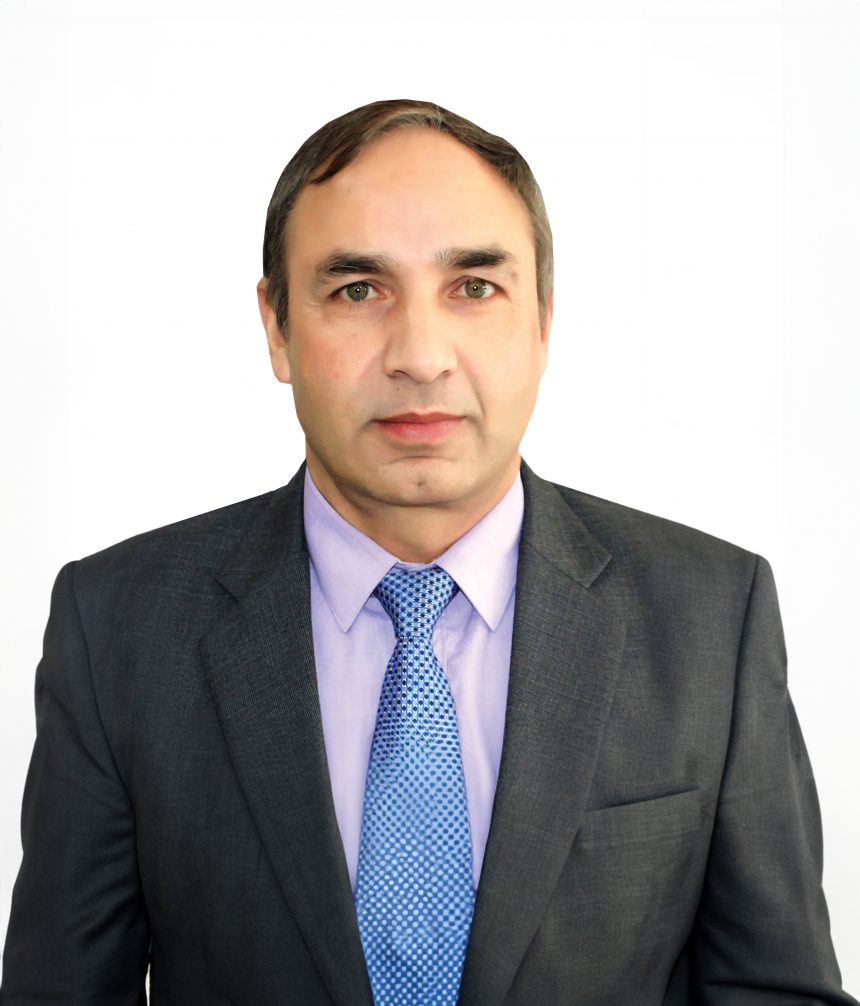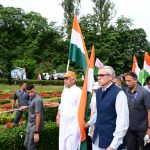In a candid conversation with Rising Kashmir Correspondent Shafat Malik, Vice Chancellor of Sher-e-Kashmir University of Agricultural Sciences and Technology Kashmir (SKUAST-K), Prof Nazir Ahmad Ganie, talks about the university’s journey, its contribution to agriculture, challenges, and plans for the future of agriculture in Jammu and Kashmir.
RK: Can you share your journey as the Vice Chancellor of SKUAST-K?
VC: First, I thank Rising Kashmir for giving me this opportunity. Sher-e-Kashmir University of Agricultural Sciences and Technology was established in 1982. The turbulent years that followed in J&K posed major challenges for its growth. But today, SKUAST-K is among the top universities in the country, consistently ranked in the top 10 overall and 5th among state agricultural universities.
Over the years, SKUAST-K has become a hub of quality education, research, and innovation. Our contributions to crop improvement, such as releasing rice varieties like Shalimar Rice 4, have significantly increased productivity. Ninety percent of the area under rice in J&K is cultivated using varieties developed here, with yields reaching 100 quintals per hectare compared to the national average of 30. Similarly, our work in high-density apple orchards has boosted productivity from 10 to 70 tons per hectare which has greatly enhanced farmer incomes.
RK: What are the major achievements of SKUAST-K in agriculture and allied sectors?
VC: SKUAST-K has played a transformative role in J&K’s agriculture. Along with rice, we revived Mushkbudji, a heritage rice variety that was on the verge of extinction. Today, Mushkbudji fetches five times the normal price, benefiting farmers immensely. Our work in maize has increased yields from 1 ton to 6 tons per hectare. In the animal sector, we have developed vaccines and diagnostics to prevent diseases and improve productivity. Our focus is on innovation, and SKUAST leads J&K in patents and startups with 44 patents and 55 agribusinesses operationalized.
RK: Agriculture in J&K faces many challenges. How is SKUAST-K addressing them?
VC: Land scarcity is a major concern, with only 17% of J&K’s land being arable. Rapid urbanization is shrinking this further. We are tackling this by promoting vertical farming and precision agriculture to maximize productivity.
Climate change is another big challenge. Glacial melt and erratic weather patterns are impacting agriculture. We are developing resilient crop varieties and sustainable practices to address these changes. Our Holistic Agriculture Development Plan (HADP), worth ₹5,000 crore focuses on food security, equity for marginalized communities, and sustainability. We’ve identified 29 sub-projects to boost employment and commercialize agriculture in J&K.
RK: How is SKUAST-K embracing modern technology to shape the future of agriculture?
VC: Technology is the key to unlock agriculture’s potential. SKUAST-K is the first university in India to establish an Artificial Intelligence (AI) center for agriculture. We’ve partnered with IIT Mandi for a B.Tech program in AI-driven agriculture to ensure students are prepared for the future.
Our university is leading the way in automation, mechanization, and precision agriculture. We’re setting up high-tech irrigation systems to optimize water and fertilizer use to address climate challenges. Our polyhouses create controlled environments, allowing year-round crop cultivation despite changing weather conditions. These advancements will ensure sustainable growth in J&K’s agriculture sector.
RK: How does SKUAST-K engage with farmers and the locals?
VC: We have a strong connection with far mers through Kisan Khidmat Ghars (KKGs) at the panchayat level which provide a single-window platform for all their needs.
Our students also adopt villages to guide farmers on modern practices. We’ve introduced a cyber extension program, where farmers receive real-time weather and crop updates through mobile apps. These initiatives ensure that the latest research and technology reach the grassroots.
RK: How SKUAST-K empowers graduates to tackle unemployment in J&K with skills and innovation?
VC: Agriculture holds the potential to tackle unemployment. SKUAST-K skills 20,000 youth annually in agribusiness and entrepreneurship. We’ve shifted our focus to innovation and startup culture to encourage students to create jobs rather than seek them. Our graduates are now leading agribusiness ventures, providing employment to others.
RK: What steps is SKUAST-K taking to enhance seed quality and boost farm productivity?
VC: We’re working to improve seed quality and availability, which directly impacts farm productivity and income. Over the years, SKUAST has developed 112 high-quality crop varieties, including rice, maize, vegetables, and walnuts, ensuring better yields for farmers.
RK: How is SKUAST addressing sustainability and environmental concerns?
VC: Sustainability is a core focus. We’re reducing the negative impacts of chemical fertilizers and pesticides by promoting organic alternatives and biocontrol agents. Integrated pest and nutrient management ensures efficient use of resources.
Our programs in precision agriculture minimize water and fertilizer wastage. For example, traditional farming wastes 70% of water, while precision methods ensure optimal usage. Such practices will protect the environment while ensuring productivity.
RK: What are SKUAST-K’s future goals and aspirations?
VC: J&K’s agricultural economy is currently worth $4 billion, but its potential is $80 billion. Our mission is to unlock this by embracing technology, empowering youth, and modernizing farming practices.
We’re also focusing on internationalization. SKUAST is the first agricultural university in India to admit international students, and our enrollment has doubled in recent years. With innovation, sustainability, and collaboration, SKUAST aims to lead the way in transforming agriculture in J&K and beyond.
RK: What inspired your vision for SKUAST-Kashmir, and how has it evolved under your leadership?
VC: Redefining the vision for SKUAST-Kashmir and fostering a change in the mindset of staff and students towards a socially responsible institution of international standards has been my endeavour as Vice-Chancellor. This journey tested my leadership, as challenging entrenched, old-fashioned approaches conditioned by decades of stereotypes is among the most arduous tasks.
To achieve this, I focused on the following key areas:
- Redefining the university’s very purpose: Revisiting and reshaping its goal, vision, and mission.
- Introducing transformational policy reforms: Paving the way for a progressive and dynamic institution.
- Building consensus: Garnering support for these radical changes among stakeholders.
- Institutionalizing reforms: Embedding changes within the university’s regulatory framework.
- Demonstrating impact: Showcasing the outcomes of these reforms to earn the trust of students, staff, society, and the government.
RK: What has been the sequel to your redefined vision for SKUAST-Kashmir?
VC: In alignment with the redefined vision of ‘SKUAST-K as an innovation-led university for the bold and noble purpose of enhancing the quality of life of people,’ we developed the SKUAST-K Developmental Model, structured around four verticals:
- SKUAST-K Agri-Education Model
Tailored to the National Education Policy – 2020, this model has set a benchmark, becoming the National Model across all 74 agricultural universities. Under this framework, SKUAST-K improved its ranking from 37th in 2019 to the 4th Best State Agricultural University in 2023, and is now ranked among the Top 10 ICAR Institutes as per the latest NIRF rankings by the Ministry of Education.
- Research and Innovation Model
Designed to drive a knowledge-based, technology-driven agri-economy, this model has earned SKUAST-K the Rank 1 in Innovations with:
- 37 patents filed in 4 years
- 23 IPRs in 2024 – the highest among all 74
agricultural universities in India and 11 universities in J&K UT
- Extension and Outreach Model
Focused on bridging the gap between farmers and extension services, this model aims to reduce the farmer-extension worker ratio from 3000:1 to 1:1 through:
- KVK to KKG Expansion: Establishing 20 Krishi Vigyan Kendras (KVKs) at the district level and scaling to 2000 Kisan Khidmat Ghars (KKGs) at the Panchayat level, serving as one-stop centres for knowledge, technology, and critical inputs.
- Student Rural Exploration: Involving 4500 students (in groups of 7) to adopt 700 cluster villages during their degree programs, fostering experiential learning and grassroots innovation.
- Cyber Extension: Implementing AI-driven Decision Support Systems (DSS) to provide location-specific advisories, crop-specific packages of practices, yearly calendars of operations, input dealers, schemes, and expert guidance at farmers’ fingertips.
- Social Development Model
Anchored in the Holistic Agriculture Development Plan (HADP) of Rs 5012 crore, this model is built on three verticals:
- Food, Nutrition, and Economic Security: Boosting primary agriculture (production and productivity) while advancing secondary and commercial agriculture for enhanced profitability.
- Ecosystem and Environmental Sustainability: Promoting regenerative and conservation agriculture for long-term sustainability.
- Equity and Inclusiveness: Ensuring livelihood security and social development for marginal and landless farmers through inclusive policies and targeted initiatives.
This integrated developmental model underscores SKUAST-Kashmir’s commitment to excellence, innovation, and social responsibility, setting a path toward a sustainable and inclusive future.
Building on this redefined vision, SKUAST-Kashmir undertook bold policy reforms to establish a strong foundation for excellence in teaching, research, outreach, and innovation. These reforms have not only transformed the university’s functioning but have also positioned it as a trailblazer in agricultural education and entrepreneurship across the country.
RK: What are the key spin-off effects of these transformative models?
VC: The transformational models and reforms introduced at SKUAST-Kashmir have triggered significant spin-off effects, propelling the university towards becoming a socially responsible institution of international standards. These impacts are testimony to the collective efforts of the university community in redefining its goals and delivering on its bold vision and mission.
The Spin-off Effects of Our Models Include:
- Internationalisation of Education
We are attracting foreign students to our campus while providing opportunities for our students to gain global exposure by deputing them to foreign universities. This initiative aligns with our aim to make SKUAST-K a globally recognized institution.
- Transition to a Multi-Disciplinary University
We expanded from the conventional 4 undergraduate programs to 13 diverse and high-end programs, encompassing fields such as basic and social sciences, AI & ML, drones and robotics, CRISPR-CAS and gene editing, vaccines and diagnostics, data science and economics, RS-GIS, and urban planning.
- Establishment of New Centres of Excellence
To remain aligned with international developments, we have established specialized Centres of Excellence, fostering cutting-edge research and innovation.
- E-Governance for Efficiency and Transparency
By embracing e-governance, we have enhanced operational efficiency and brought greater transparency to our administrative processes.
- State-of-the-Art Infrastructure
We have created modern infrastructure that fosters a conducive learning and working environment, ensuring maximum efficiency and productivity.
- Student Enrolment Doubled
Our undergraduate enrolment has surged by 100%, increasing from 450 students in 2019 to 900 students in 2024, reflecting the growing trust in SKUAST-K’s academic excellence.
- Equity and Inclusion
We now offer scholarships to all Master’s and PhD students, alongside an endowment fund to support economically disadvantaged students, ensuring that education remains accessible to all.
- Diversity and Cultural Exchange
Over 30% of our students now hail from other states of the country, creating a vibrant and diverse academic community. International student interest is growing, with 200 applications received in 2024 alone.
- Financial Discipline
For the first time, the university has achieved financial accountability and transparency by preparing up-to-date balance sheets, reflecting our commitment to fiscal responsibility.
- Paperless Examination System
The adoption of a paperless examination system has not only enhanced efficiency but also resulted in significant environmental savings, reducing paper usage by 2.1 million pages annually.
These outcomes underline our relentless pursuit of excellence and our unwavering commitment to making SKUAST-Kashmir a beacon of knowledge, innovation, and societal development. The journey ahead is even more promising as we build on this momentum to achieve greater milestones together.
RK: What key reforms have you introduced during your tenure?
VC: Key Reforms Introduced During My Tenure Include:
- Innovation & Entrepreneurship as the 4th Mandate
We became the first institution in the National Agricultural Research and Education System (NARES) to adopt Innovation and Entrepreneurship as a core mandate alongside education, research and extension.
- SISP (SKUAST-K Innovation and Startup Policy)
SKUAST-K was the first SAU to adopt a startup policy aligned with the National Innovation and Startup Policy (NISP) of the Ministry of Education. This policy has provided a framework to translate research and innovation into startups by both students and faculty. Today, we take pride in 7 faculty startups and 30 student startups – more than any other SAU in the country.
- SKIIE Center (SKUAST-K Innovation, Incubation and Entrepreneurship Center)
Our incubation center, SKIIE, has taken research and innovation to new heights by facilitating commercialization. It is now ranked No 1 among SAUs in terms of the number of startups incubated and seed grants secured.
- Directorate of Innovations and Entrepreneurship
We were the first SAU to establish a dedicated Directorate of Innovations and Entrepreneurship, aimed at fostering and regulating a vibrant startup and entrepreneurial ecosystem both within the university and beyond.
- CAIML (Center for Artificial Intelligence & Machine Learning)
To keep pace with Agri 4.0 technologies, we established CAIML, which focuses on advancements like AI, ML, drones, robotics, block chain for traceability, precision agriculture, and RS-GIS for land-use and urban planning.
- School of One Health
In line with the global One Health approach, we developed a roadmap to establish a ‘School of One Health’ to adopt an integrated framework that optimizes the health of people, animals, and the environment.
- IB&PR (Institute of Business and Policy Research)
We launched the Institute of Business and Policy Research as a think tank to conduct policy analysis and facilitate knowledge-driven research that contributes to socio-economic policy-making and implementation.









